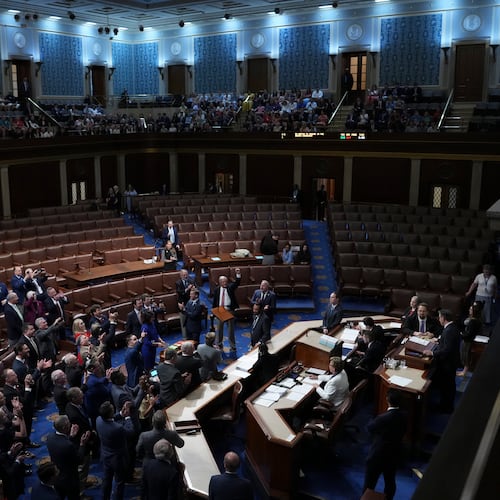Kimberly E. West and Christopher D. Holmes are second year Ph.D. educational policy and administration students at the University of Georgia. West's research interests include school choice reform measures and the participation of special needs students in such measures. Holmes' research interests include federal education law, such as supplemental improvement grants.
In this column, they seek to draw attention to the federal Every Student Succeeds Act and the need for Georgians to get involved in the creation of the state's plan. They explain how Every Student Succeeds differs from No Child Left Behind. Explaining they are parents, former educators, future education policymakers and community members, West and Holmes believe more Georgia citizens should become involved in the state's education laws and policies.
By Kimberly E. West and Christopher D. Holmes
As the November election quickly approaches and commercials for and against the Opportunity School District fill the airwaves, it is important to note there is another shift going on in state education policy all Georgians should be aware of. That shift involves a recent change to federal education law that will directly affect local school districts, schools, and classrooms. Additionally, this change in education law is something Georgians should be engaged in through feedback and questions.
On Sept. 14, the Georgia Department of Education held its third public meeting in Fulton County to provide community stakeholders with the opportunity to give input and feedback on the state’s new Every Student Succeeds Act plan. The Every Student Succeeds Act is the latest reauthorization of federal Elementary and Secondary Act of 1965; previous reauthorizations of the law include the No Child Left Behind Act in 2001 and the Improving America’s School Act in 1994. The Every Student Succeeds Act was a bi-partisan effort signed into law by President Barack Obama in December 2015.
The new reauthorization reduces much of the federal oversight established during the high-stakes testing accountability era of No Child Left Behind, which includes decreasing testing requirements, eliminating local districts requirements to achieve adequate yearly progress, and giving states the power to decide how to address and improve struggling schools. In general, Every Student Succeeds Act reverses the one-size fits all approach to education, giving power back to the states and local school districts. States are required to submit their plan to the U.S. Department of Education this year for approval, with implementation beginning during the 2017-18 school year.
While family and community feedback has previously been welcomed when enacting new education laws and policies, it is especially important now considering ESSA gives states more power over significant areas of education reform that can have a positive effect on Georgia’s students, families, and schools. Important topic areas addressed under the law include testing requirements, teacher development and evaluation, school accountability, and funding. Special student populations, such as special needs students, English language learners, and gifted learners, are also given more attention.
Additionally, the Every Student Succeeds Act calls for the education of the whole child as a focus on social-emotional learning is brought to the forefront; which changes the scope of what is required to address the diverse needs of students.
Additional details of the federal Every Student Succeeds Act include:
Math and reading testing guidelines will remain for students in grades three through eight. High school students will continue to be tested once.
States are no longer required to demonstrate 100% proficiency in math and reading.
Title I funding will remain intact.
States will identify the lowest-performing schools and decide the best measures to remediate those schools.
Denial of the Secretary of Education of certain powers, such as pressuring states to adopt certain measures (e.g. requiring states to adopt a particular set of academic content standards); a tactic used during the Race to the Top program.
Former South African President Nelson Mandela once said, “Education is the most powerful weapon which you can use to change the world.” Thus, as federal education moves from the high-stakes testing era of No Child Left Behind to a more student-focused approach with more state and local control under the Every Student Succeeds Act, now is the time to embrace the opportunity for all stakeholders to contribute to Georgia’s education policy.
Accompanying the implementation of Every Student Succeeds Act is the opportunity to bring about changes that will influence Georgia’s school not just today, but for years to come. Your voice as a stakeholder (parent, student, educator, businessperson, community member) is vital.
Four additional meetings have been planned throughout the state to bring community stakeholders and state policymakers together. The remaining meeting dates are as follows:
Oct. 12 in Laurens County
Oct. 13 in Chatham County
Oct. 17 in Gordon County
All meeting will be held from 6 p.m. to 8 p.m. More information can be found here. If you cannot attend one of the scheduled meetings, you can submit your feedback via email to essa@doe.k12.ga.u
About the Author
Keep Reading
The Latest
Featured




